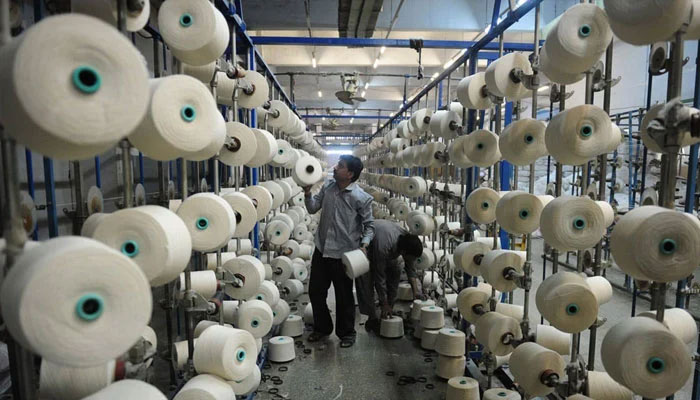‘Textile exports surge 15pc in August’
Mukhtar highlights that exporters are facing severe financial constraints due to advance payment of double income tax
FAISALABAD: Textile exports experienced a 15 percent month-on-month growth in August, but this increase could have reached 25 percent, if critical issues related to exporters’ liquidity and taxation had been addressed, said Khurram Mukhtar, Patron-in-Chief of the Pakistan Textile Exporters Association (PTEA), while talking to ‘The News’.
Mukhtar highlighted that exporters are facing severe financial constraints due to the advance payment of double income tax and complications in the General Sales Tax (GST) regime.
He explained that substantial investments remain stuck, especially following the withdrawal of the Export Facilitation Scheme (EFS) on domestic purchases, which has further complicated the situation.
According to Mukhtar, approximately Rs55 billion in sales tax refunds is overdue, with Refund Payment Orders (RPOs) pending since August 12. The refund cycle now exceeds 200 days, causing major disruptions for textile exporters.
Additionally, around Rs25 billion in duty drawback refunds have been pending since August 15, while only Rs2.5 billion of the Rs38 billion under the DDT/DLTL scheme have been disbursed, he said.
He noted that the current budget allocation of Rs10 billion is insufficient to cover refunds due from as far back as December 2022. Moreover, deferred sales tax and income tax refunds totalling Rs150 billion and Rs100 billion, respectively, remain stuck in the system, he said.
He further said these liquidity challenges have left exporters struggling to reinvest in their businesses, with much of their equity tied up in pending refunds.
Mukhtar said that the financial burden of 19 percent on delayed refunds is squeezing exporters’ margins and hindering their ability to expand operations.
He stressed the importance of addressing these issues promptly to help exporters capitalise on global market opportunities. He urged the government to prioritise the textile sector by fast-tracking refunds and resolving the current taxation issues.
The textile body chief said that resolving these bottlenecks is essential for optimising export potential and ensuring significant contributions to the national economy.
-
 'Too Hard To Be Without’: Woman Testifies Against Instagram And YouTube
'Too Hard To Be Without’: Woman Testifies Against Instagram And YouTube -
 Kendall Jenner Recalls Being ‘too Stressed’: 'I Want To Focus On Myself'
Kendall Jenner Recalls Being ‘too Stressed’: 'I Want To Focus On Myself' -
 Dolly Parton Achieves Major Milestone For Children's Health Advocacy
Dolly Parton Achieves Major Milestone For Children's Health Advocacy -
 Oilers Vs Kings: Darcy Kuemper Pulled After Allowing Four Goals In Second Period
Oilers Vs Kings: Darcy Kuemper Pulled After Allowing Four Goals In Second Period -
 Calgary Weather Warning As 30cm Snow And 130 Km/h Winds Expected
Calgary Weather Warning As 30cm Snow And 130 Km/h Winds Expected -
 Maura Higgins Reveals Why She Wears Wigs On 'The Traitors' And What Her Real Hair Is Like
Maura Higgins Reveals Why She Wears Wigs On 'The Traitors' And What Her Real Hair Is Like -
 Brandi Glanville Reveals Shocking Link Of Facial Issues To Leaking Implants, Claims 'no' Support From Ex Eddie Cibrian
Brandi Glanville Reveals Shocking Link Of Facial Issues To Leaking Implants, Claims 'no' Support From Ex Eddie Cibrian -
 Who Is Rob Rausch’s Girlfriend? 'The Traitors' Winner Linked To Kansas City Woman
Who Is Rob Rausch’s Girlfriend? 'The Traitors' Winner Linked To Kansas City Woman -
 Bobby J. Brown, 'Law & Order' And 'The Wire' Actor, Dies At 62
Bobby J. Brown, 'Law & Order' And 'The Wire' Actor, Dies At 62 -
 Netflix Gives In As Paramount Offers Massive Breakup Fee To Step Away From Warner Bros. Discovery Bid
Netflix Gives In As Paramount Offers Massive Breakup Fee To Step Away From Warner Bros. Discovery Bid -
 Who Won 'Traitors' Season 4? Rob Rausch Claims $220,800 Grand Prize
Who Won 'Traitors' Season 4? Rob Rausch Claims $220,800 Grand Prize -
 Niall Horan Shares Update On New Music On The Way
Niall Horan Shares Update On New Music On The Way -
 Backstreet Boys Member Brian Littrell Refiles Trespassing Lawsuit Against Florida Retiree
Backstreet Boys Member Brian Littrell Refiles Trespassing Lawsuit Against Florida Retiree -
 Kate Middleton Dubbed ‘conscious Shopper’ By Famous Fashion Expert
Kate Middleton Dubbed ‘conscious Shopper’ By Famous Fashion Expert -
 Princess Catherine Joins Volunteers In Newtown During Powys Visit
Princess Catherine Joins Volunteers In Newtown During Powys Visit -
 Shamed Andrew Thought BBC Interview Was ‘time To Shine,’ Says Staff
Shamed Andrew Thought BBC Interview Was ‘time To Shine,’ Says Staff




